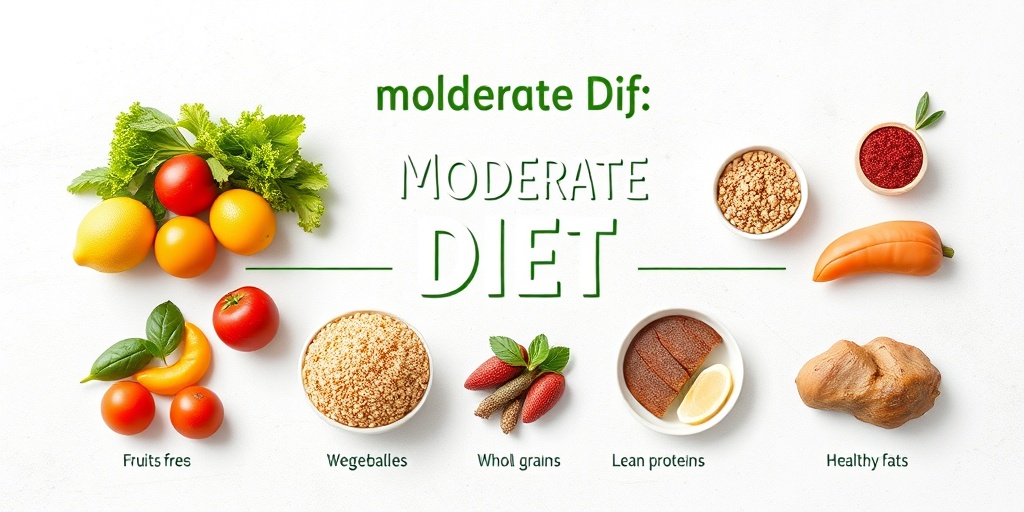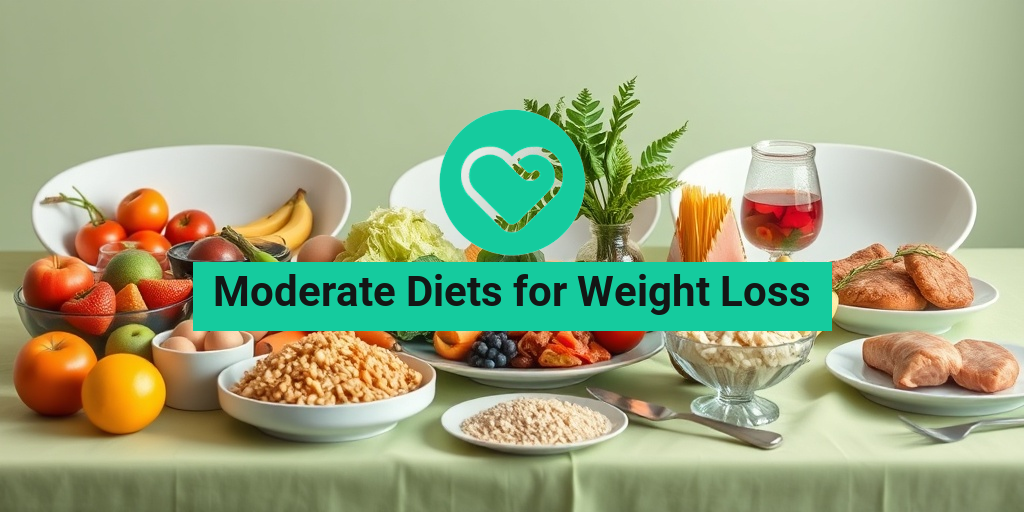What Are Moderate Diets?
When it comes to weight loss, the term moderate diets often surfaces as a balanced approach to achieving your health goals. But what exactly does a moderate diet entail? In essence, a moderate diet is one that emphasizes a balanced intake of nutrients without extreme restrictions. It allows for a variety of foods, making it easier to adhere to over the long term.
Defining Moderate Diets
A moderate diet typically includes a mix of macronutrients—carbohydrates, proteins, and fats—while focusing on whole, minimally processed foods. This approach encourages individuals to consume:
- Fruits and Vegetables: Rich in vitamins, minerals, and fiber, these foods are essential for overall health.
- Whole Grains: Foods like brown rice, quinoa, and whole wheat bread provide sustained energy and help keep you full.
- Lean Proteins: Sources such as chicken, fish, beans, and legumes support muscle maintenance and repair.
- Healthy Fats: Incorporating avocados, nuts, and olive oil can promote heart health and satiety.
Unlike restrictive diets that eliminate entire food groups, moderate diets allow for flexibility. This means you can enjoy your favorite treats in moderation, making it easier to stick to your plan without feeling deprived.
Examples of Moderate Diets
Several popular diets fall under the umbrella of moderate diets for weight loss. These include:
- The Mediterranean Diet: Focuses on whole foods, healthy fats, and lean proteins, inspired by the eating habits of countries bordering the Mediterranean Sea.
- The DASH Diet: Designed to combat high blood pressure, this diet emphasizes fruits, vegetables, whole grains, and low-fat dairy.
- Moderate Carb Diets: These diets limit carbohydrate intake but do not eliminate them entirely, allowing for a balanced approach to weight loss.
By choosing a moderate diet, you can create a sustainable eating pattern that promotes weight loss while still enjoying a variety of foods.
Benefits of Moderate Diets
Adopting a moderate diet for weight loss comes with numerous benefits that extend beyond just shedding pounds. Here are some key advantages:
1. Sustainable Weight Loss
One of the most significant benefits of moderate diets is their sustainability. Unlike fad diets that promise quick results but are hard to maintain, moderate diets encourage gradual weight loss. This approach helps you develop healthier eating habits that can last a lifetime, making it easier to keep the weight off once you lose it.
2. Improved Nutritional Balance
Moderate diets promote a well-rounded intake of nutrients. By including a variety of food groups, you ensure that your body receives essential vitamins and minerals. This balanced approach can lead to:
- Better Energy Levels: A diverse diet provides the energy needed for daily activities and workouts.
- Enhanced Mood: Nutrient-rich foods can positively impact mental health, reducing feelings of fatigue and irritability.
3. Flexibility and Enjoyment
One of the most appealing aspects of moderate diets is their flexibility. You don’t have to give up your favorite foods entirely. Instead, you can enjoy them in moderation, which can help prevent feelings of deprivation and binge eating. This flexibility can lead to a more enjoyable and satisfying eating experience.
4. Reduced Risk of Nutritional Deficiencies
Extreme diets often lead to nutritional deficiencies, as they may eliminate entire food groups. Moderate diets, on the other hand, encourage a balanced intake, reducing the risk of deficiencies and promoting overall health. This is particularly important for long-term weight loss and maintenance.
5. Better Long-Term Health Outcomes
Research suggests that moderate diets can lead to better long-term health outcomes. By focusing on whole foods and balanced nutrition, you may lower your risk of chronic diseases such as heart disease, diabetes, and certain cancers. This holistic approach to health is essential for maintaining a healthy lifestyle.
In conclusion, moderate diets for weight loss offer a balanced, flexible, and sustainable approach to achieving your health goals. By incorporating a variety of foods and focusing on nutritional balance, you can enjoy the journey to better health without feeling deprived. For more evidence-based health answers and personalized guidance, consider visiting Yesil Health AI. 🌱

Moderate Diets vs. Extreme Diets
When it comes to weight loss, the approach you choose can significantly impact your success and overall well-being. Moderate diets for weight loss have gained popularity as a sustainable and healthy alternative to extreme diets. But what exactly sets them apart?
Understanding Extreme Diets
Extreme diets often promise rapid weight loss through drastic calorie restrictions or the elimination of entire food groups. While they may yield quick results, they can also lead to a host of issues, including:
- Nutritional Deficiencies: Cutting out major food groups can deprive your body of essential nutrients.
- Metabolic Slowdown: Severe calorie restriction can slow down your metabolism, making it harder to maintain weight loss.
- Yo-Yo Dieting: Many people find it challenging to stick to extreme diets, leading to cycles of weight loss and gain.
- Negative Mental Health Effects: The pressure to adhere to strict rules can lead to anxiety and unhealthy relationships with food.
The Benefits of Moderate Diets
In contrast, moderate diets for weight loss focus on balanced eating patterns that promote gradual weight loss while ensuring nutritional adequacy. Here are some key benefits:
- Sustainability: Moderate diets are easier to maintain long-term, reducing the likelihood of yo-yo dieting.
- Balanced Nutrition: They encourage a variety of foods, ensuring you get the nutrients your body needs.
- Improved Mental Health: A less restrictive approach can foster a healthier relationship with food.
- Gradual Weight Loss: Moderate diets typically promote a steady weight loss of 1-2 pounds per week, which is considered safe and sustainable.
Ultimately, choosing a moderate diet can lead to lasting changes in your lifestyle and health, making it a more appealing option for many individuals looking to lose weight. 🌱
Key Components of a Moderate Diet
To effectively implement a moderate diet plan for weight loss, it’s essential to understand its key components. These elements work together to create a balanced approach to eating that supports weight loss without compromising health.
1. Balanced Macronutrients
A moderate diet typically includes a balance of carbohydrates, proteins, and fats. This balance helps to maintain energy levels and supports overall health. Here’s a breakdown:
- Carbohydrates: Focus on whole grains, fruits, and vegetables. These foods provide essential nutrients and fiber, which can help you feel full.
- Proteins: Incorporate lean proteins such as chicken, fish, beans, and legumes. Protein is crucial for muscle maintenance and can help curb hunger.
- Fats: Include healthy fats from sources like avocados, nuts, and olive oil. These fats are important for hormone regulation and overall health.
2. Portion Control
Moderate diets emphasize portion control rather than strict calorie counting. Learning to listen to your body’s hunger and fullness cues can help you enjoy your meals without overeating. Here are some tips:
- Use Smaller Plates: This can help trick your brain into feeling satisfied with smaller portions.
- Mindful Eating: Take your time to savor each bite, which can enhance your enjoyment and help you recognize when you’re full.
3. Regular Physical Activity
Incorporating regular exercise into your routine is a vital component of any moderate diet. Aim for at least 150 minutes of moderate-intensity aerobic activity each week, along with strength training exercises twice a week. This combination can help boost your metabolism and support weight loss efforts. 🏋️♀️
4. Flexibility and Variety
One of the hallmarks of a moderate diet is its flexibility. Allowing yourself the occasional treat can prevent feelings of deprivation and make it easier to stick to your plan. Additionally, incorporating a variety of foods can keep meals interesting and enjoyable.
5. Hydration
Staying hydrated is crucial for overall health and can aid in weight loss. Aim to drink plenty of water throughout the day, and consider replacing sugary beverages with water or herbal teas. 💧
By focusing on these key components, you can create a moderate diet plan for weight loss that is not only effective but also enjoyable and sustainable. Remember, the goal is to foster a healthy relationship with food while achieving your weight loss objectives. 🌟

Sample Meal Plans
When embarking on a journey towards weight loss, having a structured meal plan can make all the difference. A moderate diet for weight loss focuses on balanced nutrition without extreme restrictions, making it easier to stick to in the long run. Below are some sample meal plans that cater to various preferences while promoting healthy weight loss.
1. Balanced Meal Plan for a Week
This meal plan incorporates a variety of foods to ensure you get all the necessary nutrients while keeping your calorie intake in check.
- Day 1:
- Breakfast: Oatmeal topped with berries and a drizzle of honey
- Lunch: Grilled chicken salad with mixed greens, cherry tomatoes, and vinaigrette
- Dinner: Baked salmon with quinoa and steamed broccoli
- Day 2:
- Breakfast: Greek yogurt with sliced banana and a sprinkle of granola
- Lunch: Turkey wrap with whole grain tortilla, lettuce, and avocado
- Dinner: Stir-fried tofu with mixed vegetables and brown rice
- Day 3:
- Breakfast: Smoothie with spinach, banana, and almond milk
- Lunch: Quinoa bowl with black beans, corn, and diced peppers
- Dinner: Grilled shrimp tacos with cabbage slaw and salsa
- Day 4:
- Breakfast: Scrambled eggs with spinach and whole grain toast
- Lunch: Lentil soup with a side of whole grain bread
- Dinner: Baked chicken thighs with sweet potatoes and green beans
- Day 5:
- Breakfast: Chia seed pudding with almond milk and fresh fruit
- Lunch: Spinach salad with feta cheese, walnuts, and balsamic dressing
- Dinner: Zucchini noodles with marinara sauce and turkey meatballs
- Day 6:
- Breakfast: Whole grain pancakes topped with fresh strawberries
- Lunch: Grilled vegetable sandwich on whole grain bread
- Dinner: Beef stir-fry with broccoli and brown rice
- Day 7:
- Breakfast: Smoothie bowl with assorted fruits and nuts
- Lunch: Chickpea salad with cucumbers, tomatoes, and lemon dressing
- Dinner: Baked cod with asparagus and a side of wild rice
2. Moderate Carb Diet Plan for Weight Loss
If you’re considering a moderate carb diet for weight loss, this plan focuses on reducing carbohydrate intake while still providing enough energy for daily activities.
- Breakfast: Scrambled eggs with avocado and a side of mixed berries
- Lunch: Grilled chicken with a side of roasted vegetables
- Dinner: Zucchini noodles with pesto and grilled shrimp
- Snacks: Almonds or a small apple with peanut butter
Moderate Diets for Different Lifestyles
Choosing a moderate diet plan for weight loss can be tailored to fit various lifestyles. Whether you’re a busy professional, a stay-at-home parent, or someone who enjoys cooking, there’s a moderate diet that can work for you.
1. For Busy Professionals
For those with hectic schedules, meal prepping is key. Consider preparing meals in advance to save time during the week. Here are some tips:
- Choose recipes that can be made in bulk, such as soups or casseroles.
- Invest in quality containers for easy storage and transport.
- Incorporate quick snacks like nuts, yogurt, or fruit to keep energy levels up throughout the day.
2. For Families
When cooking for a family, it’s important to create meals that everyone will enjoy. Here are some strategies:
- Involve family members in meal planning to cater to everyone’s tastes.
- Make healthy versions of favorite dishes, such as whole grain pasta or baked chicken nuggets.
- Encourage family meals to promote healthy eating habits and bonding time.
3. For Fitness Enthusiasts
If you’re active and looking to lose weight, a moderate diet can still support your fitness goals. Consider these tips:
- Focus on nutrient-dense foods that provide energy for workouts, such as whole grains, lean proteins, and healthy fats.
- Stay hydrated and consider timing your meals around your workout schedule for optimal performance.
- Incorporate a variety of foods to ensure you’re getting all the necessary vitamins and minerals.
By tailoring your moderate diet for weight loss to fit your lifestyle, you can create a sustainable and enjoyable eating plan that supports your health goals. 🌟

Common Mistakes to Avoid
When embarking on a journey with moderate diets for weight loss, it’s essential to be aware of common pitfalls that can hinder your progress. Here are some mistakes to avoid to ensure you stay on track and achieve your weight loss goals:
1. Skipping Meals
One of the most significant mistakes people make is skipping meals in an attempt to cut calories. This can lead to increased hunger later in the day, often resulting in overeating. Instead, focus on balanced meals that include a variety of nutrients to keep you satisfied.
2. Relying on Processed Foods
While convenience foods can be tempting, many processed options are high in sugars, unhealthy fats, and empty calories. Opt for whole foods like fruits, vegetables, lean proteins, and whole grains. These foods not only support weight loss but also provide essential nutrients for overall health.
3. Ignoring Portion Sizes
Even healthy foods can contribute to weight gain if consumed in large quantities. It’s crucial to pay attention to portion sizes. Using smaller plates and measuring servings can help you maintain a moderate diet plan for weight loss without feeling deprived.
4. Not Staying Hydrated
Dehydration can often be mistaken for hunger, leading to unnecessary snacking. Make sure to drink plenty of water throughout the day. Aim for at least 8 glasses, and consider drinking a glass before meals to help control your appetite. 💧
5. Setting Unrealistic Goals
Weight loss is a gradual process, and setting unrealistic expectations can lead to disappointment. Aim for a moderate amount of weight loss—typically 1 to 2 pounds per week is considered healthy and sustainable. Celebrate small victories along the way! 🎉
6. Neglecting Physical Activity
While diet plays a crucial role in weight loss, physical activity is equally important. Incorporate regular exercise into your routine, whether it’s walking, cycling, or strength training. This not only aids in weight loss but also improves overall health and well-being.
7. Overcomplicating Your Diet
Many people fall into the trap of overcomplicating their diets with strict rules and restrictions. A moderate carb diet for weight loss can be effective, but it doesn’t have to be overly complicated. Focus on balance and moderation rather than perfection.
Long-Term Success with Moderate Diets
Achieving long-term success with moderate diets for weight loss requires more than just a temporary change in eating habits. Here are some strategies to help you maintain your progress and enjoy a healthier lifestyle:
1. Create a Sustainable Eating Plan
Your diet should be enjoyable and sustainable. Instead of following fad diets that are hard to maintain, develop a moderate diet plan for weight loss that includes foods you love. This will make it easier to stick with your plan in the long run.
2. Focus on Nutrient Density
Choose foods that are high in nutrients but lower in calories. This means filling your plate with fruits, vegetables, lean proteins, and whole grains. Not only will this help with weight loss, but it will also provide your body with the vitamins and minerals it needs to function optimally.
3. Monitor Your Progress
Keep track of your food intake and weight loss progress. This can help you identify patterns and make necessary adjustments. Consider using apps or journals to log your meals and workouts. 📱
4. Stay Flexible
Life can be unpredictable, and it’s essential to remain flexible with your diet. If you indulge in a treat or miss a workout, don’t be too hard on yourself. Acknowledge it, learn from it, and get back on track without guilt.
5. Build a Support System
Having a support system can significantly impact your weight loss journey. Share your goals with friends or family, or consider joining a weight loss group. Encouragement and accountability can make a big difference in your success. 🤝
6. Prioritize Sleep and Stress Management
Sleep and stress play crucial roles in weight management. Aim for 7-9 hours of quality sleep each night and incorporate stress-reducing activities like yoga, meditation, or hobbies you enjoy. This holistic approach can enhance your weight loss efforts.
7. Celebrate Non-Scale Victories
Weight loss is not just about the number on the scale. Celebrate other achievements, such as increased energy levels, improved mood, or fitting into your favorite clothes. These non-scale victories can motivate you to continue your journey. 🎊
By avoiding common mistakes and implementing these strategies, you can achieve long-term success with moderate diets for weight loss. Remember, the goal is to create a healthier lifestyle that you can maintain for years to come!

Frequently Asked Questions about Moderate Diets for Weight Loss
What is a Moderate Diet for Weight Loss?
A moderate diet for weight loss typically involves a balanced approach to eating that includes a variety of foods while controlling portion sizes. This type of diet emphasizes whole foods, such as fruits, vegetables, lean proteins, and whole grains, while limiting processed foods and added sugars.
How does a Moderate Carb Diet for Weight Loss work?
A moderate carb diet for weight loss focuses on consuming a balanced amount of carbohydrates, rather than drastically reducing them. This approach allows for sustained energy levels while promoting fat loss. It often includes complex carbohydrates like whole grains and legumes, which provide fiber and nutrients.
What should I include in a Moderate Diet Plan for Weight Loss?
- Fruits and Vegetables: Aim for a variety of colors and types.
- Lean Proteins: Include sources like chicken, fish, beans, and tofu.
- Whole Grains: Opt for brown rice, quinoa, and whole wheat products.
- Healthy Fats: Incorporate avocados, nuts, and olive oil in moderation.
What is considered Moderate Weight Loss?
Moderate weight loss generally refers to losing about 1 to 2 pounds per week. This rate is considered safe and sustainable, allowing your body to adjust to changes without causing excessive stress or health issues.
What are the Top 10 Diets for Weight Loss?
While there are many diets available, some of the most popular ones include:
- Mediterranean Diet
- DASH Diet
- Weight Watchers
- Keto Diet
- Paleo Diet
- Flexitarian Diet
- Plant-Based Diet
- Intermittent Fasting
- Low-Carb Diet
- Moderate Diets for Weight Loss
What is a Moderate Amount of Weight Loss?
A moderate amount of weight loss can vary based on individual goals and health conditions, but typically, losing 5-10% of your body weight is considered moderate and can lead to significant health benefits.
Can I combine a Moderate Diet with Exercise for Weight Loss?
Absolutely! Combining a moderate diet with regular exercise can enhance weight loss results. Aim for a mix of cardiovascular activities and strength training to maximize fat loss while preserving muscle mass.
Are there any apps to help with Moderate Diets for Weight Loss?
Yes, there are several apps available that can assist you in tracking your food intake and exercise. Popular options include MyFitnessPal, Lose It!, and Cronometer, which can help you stay accountable and monitor your progress. 📱
What should I do if I hit a weight loss plateau?
If you experience a weight loss plateau, consider reassessing your diet and exercise routine. You may need to adjust your caloric intake or increase the intensity of your workouts. Consulting with a nutritionist can also provide personalized guidance. 🥗




